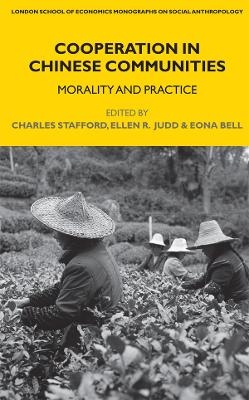
Cooperation in Chinese Communities
Bloomsbury Academic (Verlag)
978-1-350-07718-8 (ISBN)
When humans cooperate, what are the social and psychological mechanisms that enable them to do so successfully? Is cooperativeness something natural for humans, built in to our species over the course of evolution, or rather something that depends on cultural learning and social interaction? This book addresses these central questions concerning human nature and the nature of cooperation. The editors present a wide range of vivid anthropological case-studies focused on everyday cooperation in Chinese communities, for example, between children in Nanjing playing a ballgame; parents in Edinburgh organising a community school; villagers in Yunnan dealing with “common pool” resource problems; and families in Kinmen in Taiwan worshipping their dead together. On the one hand, these case studies illustrate some uniquely Chinese cultural factors, such as those related to kinship ideals and institutions that shape the experience and practice of cooperation. They also illustrate, on the other hand, how China’s recent history, not least the rise and fall of collectivism in various forms, continues to shape the experience of cooperation for ordinary people in China today. Finally, they show that in spite of the cultural and historical particularity of Chinese cooperation, it does share some underlying features that would be familiar to people coming from radically different backgrounds.
Charles Stafford is Professor at the London School of Economics, UK. Ellen R. Judd is Distinguished Professor at the University of Manitoba, Canada. Eona Bell is Affiliated Lecturer in Social Anthropology at Cambridge University and Research Officer at the London School of Economics, UK.
Contributor biographies Preface: The Morality of Chinese Cooperation, Charles Stafford (London Schoolof Economics, UK), Ellen Judd (University of Manitoba, Canada) and Eona Bell (Cambridge University, UK)1. Kin and non-kin cooperation in China, Charles (London Schoolof Economics, UK)2. Playing ball: Cooperation and competition in two Chinese primary schools, Anni Kajanus (University of Helsinki, Finland)3. The role of xiao in moral reputation management and cooperation in urban China andTaiwan, Désirée Remmert (London School of Economics, UK)4. Harmony ideology in Chinese families: Cooperating despite unfairness, Magdalena Wong (ChineseUniversity of Hong Kong, Hong Kong) 5. Cooperation in funerals in a patrilineal village in Jinmen (Taiwan), Hsiao-Chiao Chiu (University of Edinburgh, UK)6. Memory leaks: Local histories of cooperation as a solution to water-related cooperationProblems, Andrea E. Pia (London School of Economics, UK)7. Care as bureaucratic lubricant: The role of female care workers in an old people’s home in ruralChina, Cecilia Liu (Max Planck Institute for Social Anthropology, Germany)8. Reputation, morality and power in an emigrant community ( qiaoxiang ) in GuangdongProvince, Meixuan Chen (University of Bristol, UK)9. Jiaoqing ethics and the sustainability of non-kin cooperation, Di Wu (Sun Yat-Sen University,China and SOAS, UK)10. Power, gender and ‘network-based cooperation’: A study of migrant workers in Shenzhen, I-Chieh Fang (NationalTsing Hua University, Taiwan)11. Challenges to ethnic cooperation among Hong Kong Chinese in Scotland, Eona Bell (Cambridge University, UK)12. Problems in the new cooperative movement: A window onto changing cooperation mechanisms, Mark Stanford (University of Oxford, UK)13. Cooperation, competition and care: Notes from China’s New Rural Cooperative MedicalSystem, Ellen R. Judd (University of Manitoba, Canada)Notes References Index
| Erscheinungsdatum | 28.12.2018 |
|---|---|
| Reihe/Serie | LSE Monographs on Social Anthropology |
| Sprache | englisch |
| Maße | 138 x 216 mm |
| Gewicht | 388 g |
| Themenwelt | Sozialwissenschaften ► Ethnologie ► Völkerkunde (Naturvölker) |
| Sozialwissenschaften ► Soziologie | |
| ISBN-10 | 1-350-07718-6 / 1350077186 |
| ISBN-13 | 978-1-350-07718-8 / 9781350077188 |
| Zustand | Neuware |
| Haben Sie eine Frage zum Produkt? |
aus dem Bereich


